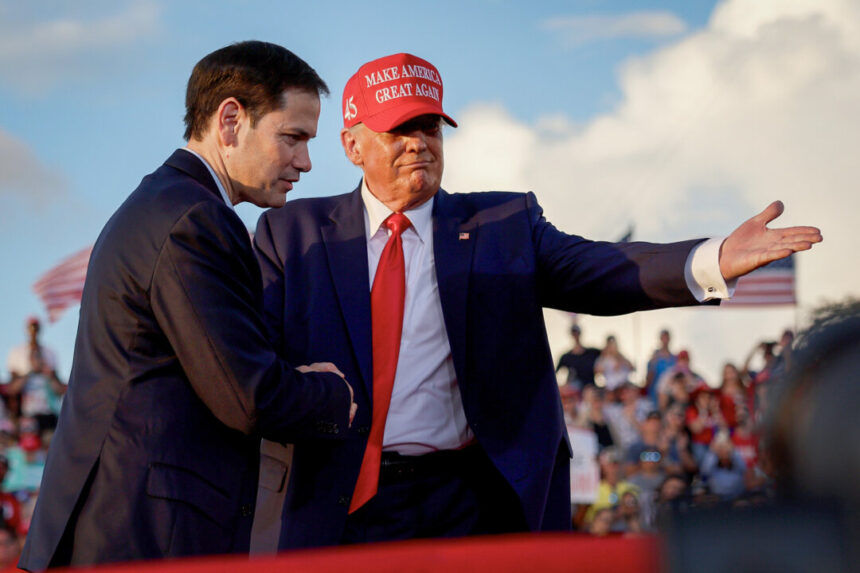Commentary
Beijing has recently implemented three political and economic measures to prepare for the next phase of U.S.–China relations as President-elect Donald Trump begins his second term in the White House.
These preparations indicate that the Chinese Communist Party (CCP) is in a challenging position, uncertain about how to handle the challenges posed by both Trump and Sen. Marco Rubio (R-Fla.), Trump’s choice for secretary of state. The Republican-controlled Senate is likely to confirm Rubio’s nomination with ease. His tough stance on China’s communist regime adds complexity to Beijing’s strategy.
Three days later, a Hong Kong court sentenced a group of prominent pro-democracy lawmakers and advocates under Hong Kong’s strict national security law, with 45 people receiving up to 10 years in prison.
On the trade front, Chinese authorities announced a reduction in export tax rebates for a variety of products on Nov. 15.
These events indicate that the CCP is getting ready for a heightened confrontation under a second Trump administration.
Defensive Move
Governments offer export tax rebates to reimburse businesses for taxes paid on exported goods. This practice aims to make domestic products more competitive in international markets by lowering the overall cost of exporting them. However, the World Trade Organization (WTO) prohibits such export subsidies.
When China joined the WTO in 2001, it pledged to eliminate these subsidies, but more than two decades later, it has not fulfilled this commitment.
Now, the CCP has decided to reduce the rebates as a late effort to demonstrate its willingness to comply with WTO regulations. This is likely a strategic move to position China more favorably in future negotiations and expected trade disputes with the incoming Trump administration.
Xi’s True ‘Red Line’
Xi defined four crucial “red line” issues as Beijing’s taboos: Taiwan, democracy and human rights, the Chinese regime’s political system and ideological path, and China’s rights to development.
These “red lines” send clear warnings: The CCP vehemently opposes any U.S. support for Taiwan’s independence and rejects external criticism or pressure regarding its governance model and human rights record.
Moreover, the regime is adamant about preserving its socialist/communist system and strongly opposes any attempts to alter or challenge its political framework. The CCP also asserts its right to pursue economic development and technological progress without external constraints.
While some argue that Taiwan is the CCP’s true “red line,” Xi’s emphasis on preserving the CCP’s political system and ideological path suggests otherwise. As China’s economy faces prolonged stagnation, safeguarding the Party’s “system” has become Xi’s ultimate red line, overshadowing even Taiwan-related issues.
By underscoring the importance of the Chinese regime’s system, Xi is indicating to Trump his desire for Washington to maintain the status quo. More importantly, Xi is addressing his domestic audience, cautioning them that the CCP will not tolerate any challenges to the existing framework that upholds CCP leadership and the socialist system in China.
Xi’s tough stance contrasts sharply with Beijing’s conciliatory tone and willingness to make concessions when China joined the WTO in 2001.
Today, the CCP’s rhetoric blames the deterioration of U.S.–China relations solely on the United States. However, the U.S. retaliated only after years of broken promises and provocations by China.
China’s challenges do not stem from Trump or similar U.S. officials; rather, they arise from the CCP’s tendency to operate outside the norms established by the global rules-based order.
Countering Backlash From Rubio
Behind the Hong Kong government’s swift verdict against pro-democracy activists lies the CCP’s fear of facing Rubio’s reaction if the verdict is delayed until after January.
All 47 defendants were involved in organizing an unofficial primary to select opposition candidates for Legislative Council elections, bolster pro-democracy representation, and challenge pro-Beijing candidates. However, authorities viewed it as an attempt to undermine the Hong Kong government, classifying it as a subversive act under the CCP-imposed national security law.
Rubio, a staunch critic of communist regimes, has been vocal about the CCP’s increasing influence in Hong Kong and would lead a strong resistance against the Hong Kong government’s treatment of pro-democracy activists.
During the 2019 pro-democracy protests in Hong Kong, as concerns mounted over dwindling freedoms and autonomy, Rubio played a pivotal role in advancing the Hong Kong Human Rights and Democracy Act through Congress. His leadership was instrumental in garnering bipartisan support for the legislation, which aimed to hold the CCP and Hong Kong officials accountable for undermining the territory’s democratic rights and freedoms.
Views expressed in this article are opinions of the author and do not necessarily reflect the views of The Epoch Times.
Please rewrite this sentence.
Source link







